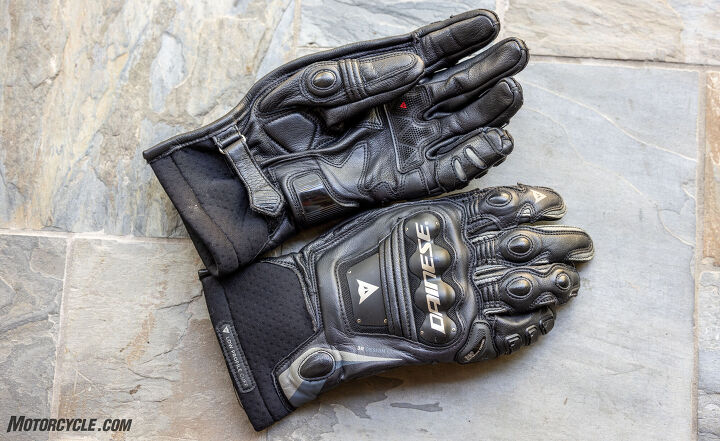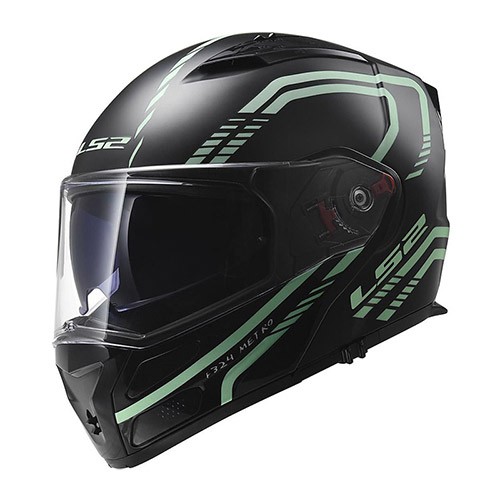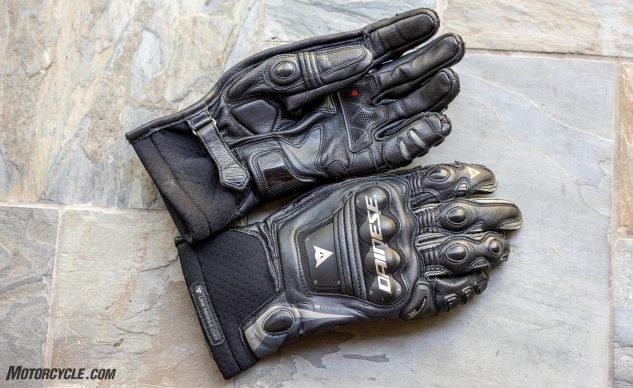
I’ve worn gauntlet gloves for years because I like the superior protection they offer. However, it always came at a cost of no cooling air flow up the sleeves. So, when I found myself looking for a new set of gauntlet gloves, I thought I’d try a pair with gauntlets that go inside the sleeves to see if they allowed for the ventilation I was craving. I ordered up a set of Dainese Steel-Pro In Gloves because of both the protective features and the fact that they had a low-profile cuff that would fit inside of jacket sleeves. When they arrived, a visual inspection showed the features to be every bit as stout as I had hoped they would be. The funny thing is that when I first put them on, I didn’t like them at all. It had been a while since I’d worn a pair of gloves that required more than a minimal break-in period. However, after the all-day use afforded by my multi-day tour in Virginia and North Carolina, I changed my tune considerably as the Steel-Pro In gloves had molded themselves almost perfectly to the shape of my hands.
Dainese Steel-Pro In Gloves are high-performance gloves that offer top-shelf protection. They do require some time to break in, though.
| Aesthetics | 9/10 | Protection | 9/10 | Comfort | 8/10 |
| Value | 9/10 | Weight | 9/10 | Innovation | 9/10 |
| Quality | 9/10 | Options | 8/10 | Weather | 9/10 |
| Desirability | 9/10 | Editor Score: 88.0% | |||
+ Highs
|
– Sighs
|
They’ve got the goods
Since Dainese sells the Steel-Pro Ins as a track glove, the emphasis in their construction is protection from high-speed mishaps. In fact, they are certified at CE Level 1 protection. The base construction is of goatskin leather with double-stitched seams. The gloves are precurved to prevent the leather from bunching up under your fingers when wrapped around the grips. A single piece of leather wraps around the outside of the hand, while the inside edge features a single seam. This means that the only seam in the piece of leather that forms the inner chassis of the glove appears to run from the wrist up to where the pieces of the index finger join the gloves. A second layer of leather covers the initial one from the heel of the hand all the way across the back of the hand. Additional layers also protect other vulnerable portions of the palm area, like the crotch between the thumb and forefinger.

The palms are constructed of a single piece of leather with additional armor and protective leather layers on top.
Armor is used throughout the gloves where they might contact the ground, with much of it being thermoplastic resin construction to promote sliding. Rather than use a flap of leather to attach the pinky to the ring finger, Dainese uses a plastic Distortion Control device in addition to the three slippery plastic pieces on the pinky. The remainder of the knuckle protection comes from composite insert, while the back of the hands and knuckles get stainless steel over the composites, too. The backs of the fingers received additional layers of leather with accordion panels to promote flexibility.
One interesting feature is the ribbed polyurethane patch at the base of the fingers on the palm. Dainese claims this gives the rider better feel on the grips. I don’t know about the extra feel, but I do think that this patch added to the break-in time the gloves required. However, once broken in, I was no longer aware of it as I wrapped my hands around the grips.

The cuff that goes inside of the jacket’s or leathers’ sleeve. The wrist strap keeps the gloves safely in place during a slide.
While all of the features listed above are what I would expect from a track-focused glove, it’s the wrist construction that initially caught my attention. The narrow, low-profile cuff is designed to fit inside of a jacket’s or leathers’ sleeves. Because of that, the gloves are only affixed to the riders hands by a sturdy, narrow wrist strap. Since there is no gauntlet going over the sleeve, the inner gauntlet (for lack of a better term) is constructed from a fabric Dainese calls Airprene. This flexible fabric is quite thick and appears to be abrasion resistant to protect the gap between where the leather of the glove ends and the leather sleeve begins. Because this adds thickness to the rider’s wrist, sleeves with particularly narrow cuffs may have trouble fitting over the gauntlet.
Daily use
As I said above, I was surprisingly disappointed when I first donned the gloves. They felt thick and stiff, something unusual after being coddled by gloves that felt broken in on the first use. Undaunted, though, I committed to wearing them during my entire East Coast tour. After a full day in the saddle, they were noticeably more comfortable, and by the end of my trip, I was glad that I’d brought the gloves. This weekend, I’ll be wearing them for two back-to-back track days. So, that should say something about how I feel about them.

The Distortion Control keeps the pinky from being pulled outward, while the sliders keep the leather from catching on the pavement.
In my month of riding with the Dainese Steel-Pro In Gloves, I’ve gone from being disappointed with their initial stiffness to having them be a regular part of my sport-riding kit. I think that their sturdy construction, which contributed to the need for an extended break-in period, will balance out in the long-term durability and crash protection of the gloves. With a $320 retail price, this build quality, longevity, and protection are why you buy premium gloves. I expect to have these gloves in my riding kit for years to come.
Shop for the Dainese Steel-Pro In Gloves here

From the protective armor on the back of the hands to the accordion seams on the fingers, the Dainese Steel-Pro In Gloves have all the features we’d expect from premium, track-focused gloves.
FAQ
What brand of motorcycle gloves is best?
Rather than shopping by brand first, you should decide how you plan on using the gloves and what kind of protection you need from a motorcycle glove. The requirements for a commuter glove differ widely from a racing glove. That said, look to the major brands of motorcycle-specific gear, like Alpinestars, Dainese, Racer, REV’IT!, Spidi, and many others.
Why do motorcycle riders wear gloves?
When you fall down, be it walking across the room or crashing a motorcycle, your instinct is to put out your hands to break your fall. This makes sense because you’re trying to protect the vital organs in your torso. However, falling down while walking involves less abrasion and impact forces than hitting the pavement at 30 mph. Motorcycle-specific gloves are designed to protect from the higher abrasion and impact forces experienced in motorcycle accidents. However, there is one feature that frequently gets overlooked: With gloves on, you will actually have a better grip to operate the bike’s controls.
Why do motorcycle gloves have hard knuckles?
The hard knuckles on motorcycle gloves help to spread out the force of an impact over a larger area to help reduce the intensity. Frequently, the hard armor is backed by shock-absorbing padding to further attenuate the forces. Finally, many motorcycle gloves have hard armor on the knuckles and palms to promote sliding on the pavement. This helps in two ways. First, a glancing blow will transmit less force to the rider. Second, by sliding instead of catching on the pavement, armor can help prevent the gloves from initiating a tumble across the pavement, which can cause more injuries than a slide.
Additional Resources
MO Tested: REV’IT! Jerez 3 Glove Review
MO Tested: Racer Hi-Per Gloves Review
Best Motorcycle Racing Gloves
We are committed to finding, researching, and recommending the best products. We earn commissions from purchases you make using the retail links in our product reviews. Learn more about how this works.
Become a Motorcycle.com insider. Get the latest motorcycle news first by subscribing to our newsletter here.

